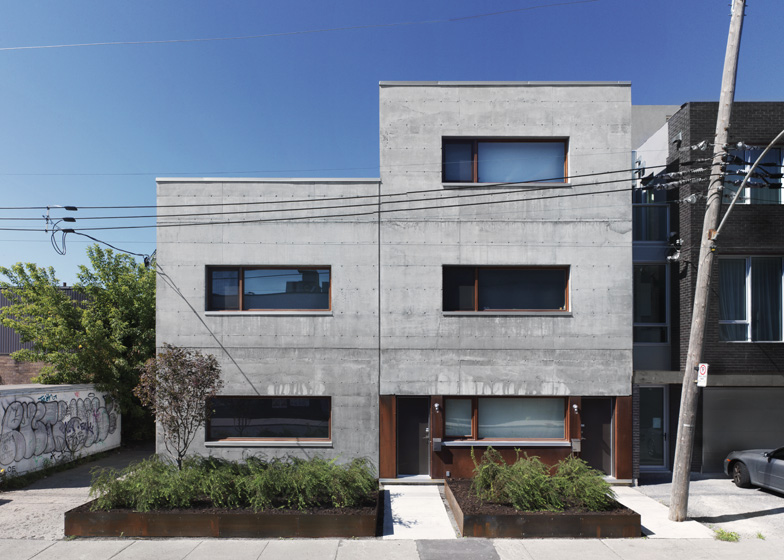Canadian architect Henri Cleinge built a house for himself in Montreal with concrete walls inside and out.
Seen from the front entrance, La Maison Beaumont comprises two concrete volumes of two storeys each.
Architect and homeowner Henri Cleinge raised one of the concrete volumes on a Corten steel base to create an entrance on the ground floor and an extra storey at the top.
Corten steel was also used to define the window frames and parts of the exterior walls.
The walls are exposed both outside and inside, so rigid insulation was placed inside the concrete during the pouring process.
The cedar ceilings and maple staircase contrast with the walls, while walnut has been used throughout the kitchen.
We've published lots of concrete houses on Dezeen, including a two-headed Australian house that can withstand the harshest cyclones and a school outside Lisbon punctuated with bold primary colours – see all concrete architecture and design.
Other homes in Canada we've featured recently include a gabled steel farmhouse in a sea of crops and a wooden cabin for two artists in Nova Scotia – see all Canadian houses.
Photographs by Marc Cramer.
Here's some more information from the architect:
Inspired to create a home to be experienced by all five senses, the Beaumont concrete house evolved as an exploration project. The design, understated, is situated in a mixed use neighborhood where residential duplexes coexist with small to midsize industrial buildings. Despite the project's integration, a number of features distinguish the project from other buildings in the area.
In contrast to the superimposed typology of apartment units located on the ground floor and second floor, the Beaumont house challenges this spatial composition by creating a modular square plan where one unit is situated on the ground and second floor, and a second unit is located on the second and third floor. This spatial tour de force is a response to the programme and sun movement, allowing each unit exposure to three orientations rather than two and to take full advantage of southern sunlight.
The house most noticeable feature, however, is the fact that nearly all exterior walls are built out of concrete exposed to the interior and the outside, with insulation in the middle. Combining rich primary materials to large modular square volumes filled with an abundance of natural light, the house contains a series of framed experiences.
The central space is the largest volume where a double height living room is defined by concrete and wood surfaces which foil off each other. The softness of the walnut cabinetry and the cedar ceiling contrast the hard textured concrete walls. The pallet of materials is reduced and disciplined. Cedar ceilings and concrete floors are used throughout. Secondary elements such as Walnut furniture with black granite surfaces are also featured.
Data sheet
Project: Beaumont House
Location: Montreal
Client: Henri Cleinge
Architect: Henri Cleinge, architect
Project Architect: Henri Cleinge
Team: Henri Cleinge, Michel Lefebvre
Structural Engineer: César Zelaya
General Contractor: Bâtitu
Area: 3200 square feet
Date of completion: 2011
Above: ground floor plan
Above: first floor plan
Above: second floor plan
Above: side elevation
Above: front elevation
Above: cross-section

